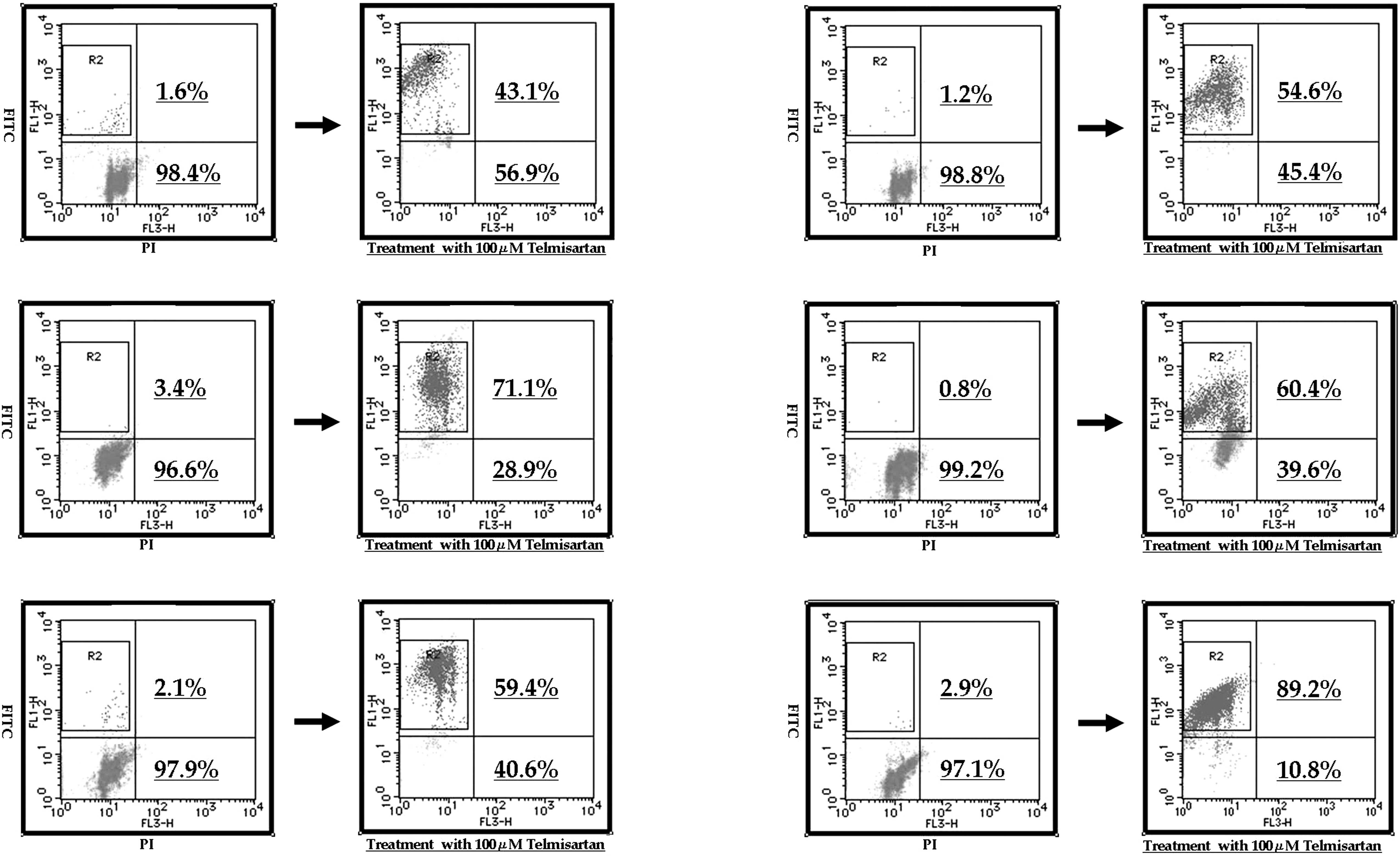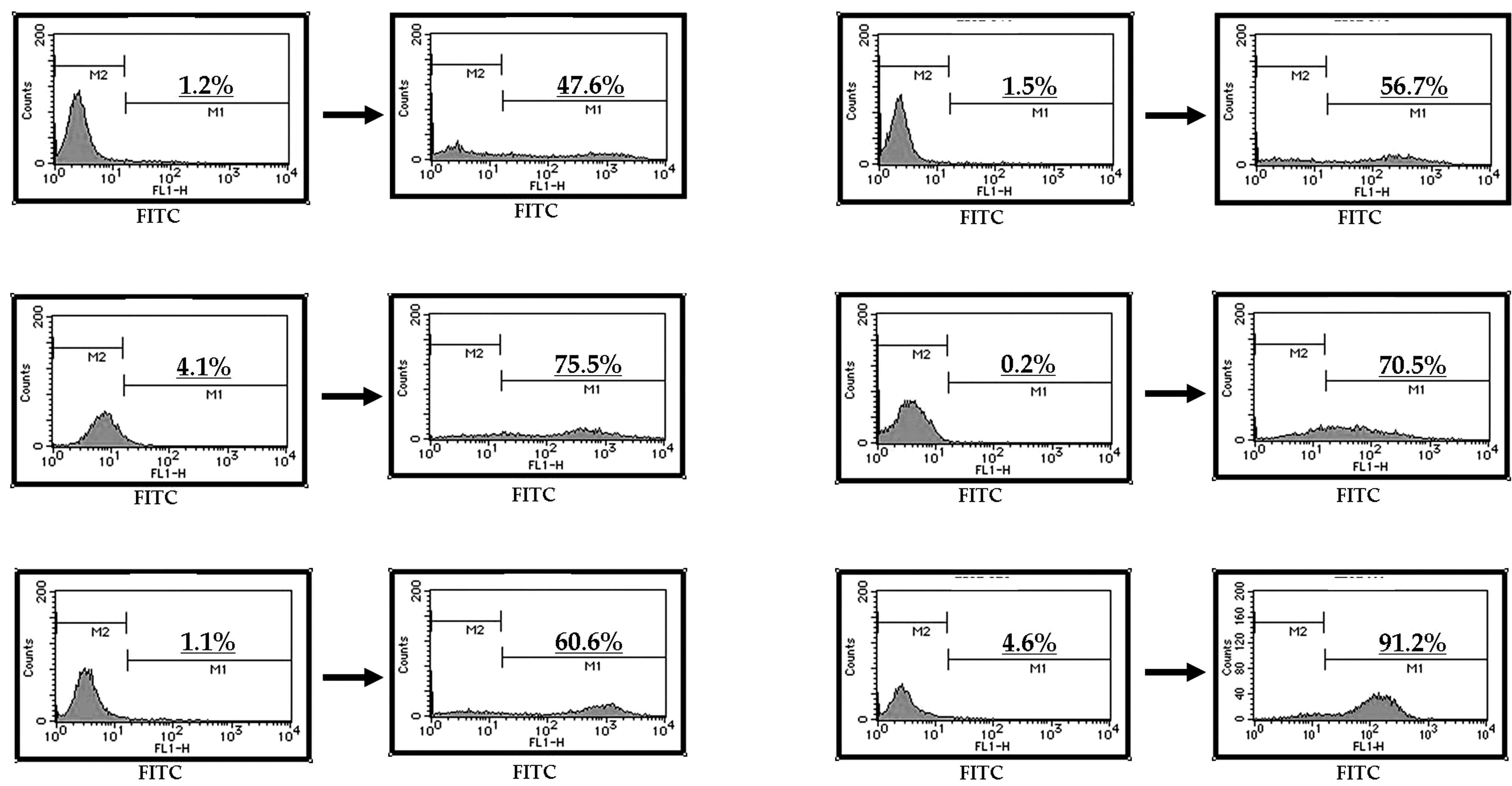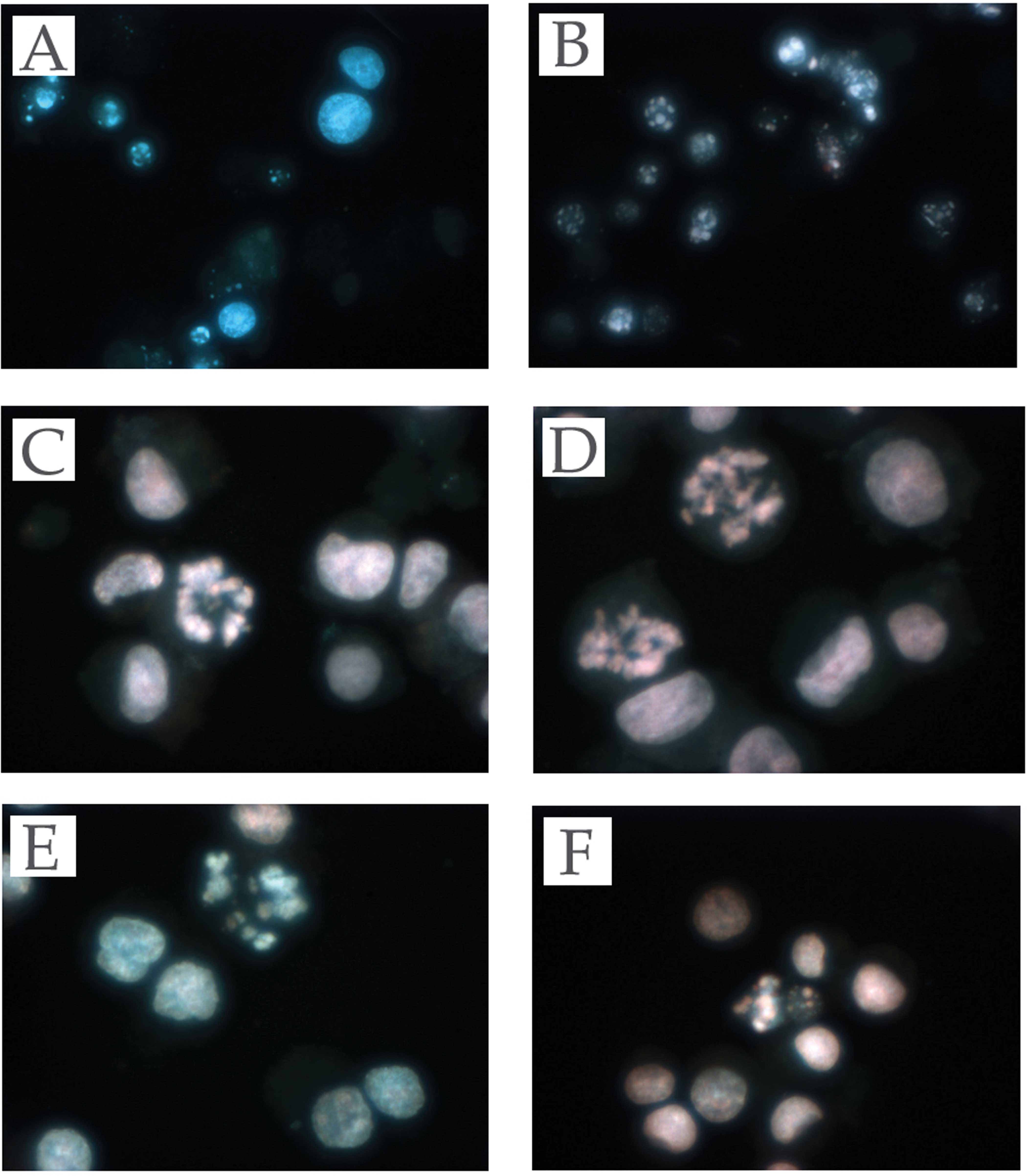|
1.
|
Weidner N, Folkman J, Pozza F, Bevilaqua
P, Allred EN and Moore DH: Tumor angiogenesis: a new significant
and independent prognostic indicator in early stage breast
carcinoma. J Natl Cancer Inst. 84:1875–1887. 1992. View Article : Google Scholar : PubMed/NCBI
|
|
2.
|
Lafyatis R, Thompson NL, Remmers EF,
Flanders KC, Roche NS and Kim SJ: Transforming growth factor-beta
production by synovial tissues from rheumatoid patients and
streptococcal cell wall arthritic rats. Studies on secretion by
synovial fibroblast-like cells and immunohistologic localization. J
Immunol. 143:1142–1148. 1989.
|
|
3.
|
Kubota T, Koshizuka K, Williamson EA, et
al: Ligand for Peroxisome proliferator-activated receptor-γ
(troglitazone) has potent antitumor effect against human prostate
cancer both in vitro and in vivo. Cancer Res. 58:3344–3352.
1998.
|
|
4.
|
Spiegelman BM: PPAR-gamma: adipogenic
regulator and thiazolidinedione receptor. Diabetes. 47:507–514.
1998. View Article : Google Scholar : PubMed/NCBI
|
|
5.
|
See S and Stirling AL: Candesartan
cilexetil: an angiotensin II receptor blocker. Am J Health Syst
Pharm. 57:739–746. 2000.PubMed/NCBI
|
|
6.
|
Folkman J: Tumor angiogenesis: therapeutic
implications. N Engl J Med. 285:1182–1186. 1971. View Article : Google Scholar : PubMed/NCBI
|
|
7.
|
Folkman J: Angiogenesis in cancer,
vascular, rheumatoid and other disease. Nat Med. 1:27–31. 1995.
View Article : Google Scholar : PubMed/NCBI
|
|
8.
|
Le Noble FA, Hekking JW, van Straaten HW,
Slaaf DW and Struyker Boudier HA: Angiotensin II stimulates
angiogenesis in the chorio-allantoic membrane of the chick embryo.
Eur J Pharmacol. 195:305–306. 1991.PubMed/NCBI
|
|
9.
|
Le Noble FA, Schreurs NH, van Straaten HW,
et al: Evidence for a novel angiotensin II receptor involved in
angiogenesis in chick embryo chorioal-lantoic membrane. Am J
Physiol. 264:460–465. 1993.PubMed/NCBI
|
|
10.
|
Benson SC, Pershadsingh HA, Ho CI, et al:
Identification of telmisartan as a unique angiotensin II receptor
antagonist with selective PPARγ-modulating activity. Hypertension.
43:993–1002. 2004.
|
|
11.
|
Inoue K, Kawahito Y, Tsubouchi Y, et al:
Expression of peroxisome proliferator-activated receptor gamma in
renal cell carcinoma and growth inhibition by its agonists. Biochem
Biophys Res Commun. 287:727–732. 2001. View Article : Google Scholar : PubMed/NCBI
|
|
12.
|
Yoshimura R, Matsuyama M, Segawa Y, et al:
Expression of peroxisome proliferator-activated receptors (PPARs)
in human urinary bladder carcinoma and growth inhibition by its
agonists. Int J Cancer. 104:597–602. 2003. View Article : Google Scholar
|
|
13.
|
Segawa Y, Yoshimura R, Hase T, et al:
Expression of peroxisome proliferator-activated receptor (PPAR) in
human prostate cancer. Prostate. 51:108–116. 2002. View Article : Google Scholar : PubMed/NCBI
|
|
14.
|
Hase T, Yoshimura R, Mitsuhashi M, et al:
Expression of peroxisome proliferator-activated receptors in human
testicular cancer and growth inhibition by its agonists. Urology.
60:542–547. 2002. View Article : Google Scholar : PubMed/NCBI
|
|
15.
|
Yoshimura R, Matsuyama M, Hase T, et al:
The effect of peroxisome proliferator-activated receptor-γ ligand
on urological cancer cells. Int J Mol Med. 12:861–865. 2003.
|
|
16.
|
Burnier M: Angiotensin II type 1 receptor
blockers. Circulation. 103:904–912. 2001. View Article : Google Scholar : PubMed/NCBI
|
|
17.
|
Dina R and Jafari M: Angiotensin
II-receptor antagonists. Am J Health-Syst Pharm. 57:1231–1241.
2000.PubMed/NCBI
|
|
18.
|
Abali H, Güllü IH, Engin H, Haznedaroğlu
IC, Erman M and Tekuzman G: Old antihypertensive as novel
antineoplastics: angiotensin-I-converting enzyme inhibitors and
angiotensin II type 1 receptor antagonists. Med Hypotheses.
59:344–348. 2002. View Article : Google Scholar : PubMed/NCBI
|
|
19.
|
Fujimoto Y, Sasaki T, Tsuchida A and
Chayama K: Angiotensin II type 1 receptor expression in human
pancreatic cancer and growth inhibition by angiotensin II type 1
receptor antagonist. FEBS Lett. 495:197–200. 2001. View Article : Google Scholar : PubMed/NCBI
|
|
20.
|
Miyajima A, Kosaka T, Asano T, et al:
Angiotensin II type 1 antagonist prevents pulmonary metastasis of
murine renal cancer by inhibiting tumor angiogenesis. Cancer Res.
62:4176–4179. 2002.PubMed/NCBI
|
|
21.
|
Goldfarb DA, Diz DI, Tubbs RR, Ferrario CM
and Novick AC: Angiotensin II receptor subtypes in the human renal
cortex and renal cell carcinoma. J Urol. 151:208–213.
1994.PubMed/NCBI
|
|
22.
|
Inwang ER, Puddefoot JR, Brown CL, et al:
Angiotensin II type 1 receptor expression in human breast tissues.
Br J Cancer. 75:1279–1283. 1997. View Article : Google Scholar : PubMed/NCBI
|
|
23.
|
Kosugi M, Miyajima A, Kikuchi E, Horiguchi
Y and Murai M: Angiotensin II type 1 receptor antagonist
candesartan as an angiogenic inhibitor in a xenograft model of
bladder cancer. Clin Cancer Res. 12:2888–2893. 2006. View Article : Google Scholar : PubMed/NCBI
|
|
24.
|
Kosaka T, Miyajima A, Takayama E, et al:
Angiotensin II type I receptor antagonist as an angiogenic
inhibitor in prostate cancer. Prostate. 67:41–49. 2007. View Article : Google Scholar : PubMed/NCBI
|
|
25.
|
Egami K, Murohara T, Shimada T, et al:
Role of host angiotensin II type 1 receptor in tumor angiogenesis
and growth. J Clin Invest. 112:67–75. 2003. View Article : Google Scholar : PubMed/NCBI
|
|
26.
|
Koh WP, Yuan JM, van Den Berg D, Lee HP
and Yu MC: Polymorphisms in angiotensin II type 1 receptor and
angiotensin I converting enzyme genes and breast cancer risk among
Chinese women in Singapore. Carcinogenesis. 26:459–464. 2005.
View Article : Google Scholar : PubMed/NCBI
|
|
27.
|
Uemura H, Hasumi H, Kawahara T, et al:
Pilot study of angiotensin II receptor blocker in advanced
hormone-refractory prostate cancer. Int J Clin Oncol. 10:405–410.
2005. View Article : Google Scholar : PubMed/NCBI
|
|
28.
|
Kawahito Y, Kondo M, Tsubouchi Y, et al:
15-deoxy-delta (12,14)-PGJ(2) induces synoviocyte apoptosis and
suppresses adjuvant-induced arthritis in rats. J Clin Invest.
106:189–197. 2000. View
Article : Google Scholar : PubMed/NCBI
|
|
29.
|
Tsubouchi Y, Sano H, Kawahito Y, et al:
Inhibition of human lung cancer cell growth by the peroxisome
proliferator-activated receptor-γ agonists through induction of
apoptosis. Biochem Biophys Res Commun. 270:400–405. 2000.
|
|
30.
|
Dreyer C, Krey G, Keller H, Givel F,
Helftenbein G and Wahli W: Control of the peroxisomal
beta-oxidation pathway by a novel family of nuclear hormone
receptors. Cell. 68:879–887. 1992. View Article : Google Scholar : PubMed/NCBI
|
|
31.
|
Kliewer SA, Umesono K, Noonan DJ, Heyman
RA and Evans RM: Convergence of 9-cis retinoic acid and peroxisome
proliferator signalling pathways through heterodimer formation of
their receptors. Nature. 358:771–774. 1992. View Article : Google Scholar : PubMed/NCBI
|
|
32.
|
Kliewer SA, Forman BM, Blumberg B, et al:
Differential expression and activation of a family of murine
peroxisome proliferator-activated receptors. Proc Natl Acad Sci
USA. 91:7355–7359. 1994. View Article : Google Scholar : PubMed/NCBI
|
|
33.
|
Chinetti G, Griglio S, Antonucci M, et al:
Activation of proliferator-activated receptors alpha and gamma
induces apoptosis of human monocyte-derived macrophages. J Biol
Chem. 273:25573–25580. 1998. View Article : Google Scholar
|
|
34.
|
Altiok S, Xu M and Spiegelman BM:
PPARgamma induces cell cycle withdrawal: inhibition of E2F/DP
DNA-binding activity via down-regulation of PP2A. Genes Dev.
11:1987–1998. 1997. View Article : Google Scholar : PubMed/NCBI
|
|
35.
|
Keelan JA, Sato TA, Marvin KW, Lander J,
Gilmour RS and Mitchell MD: 15-Deoxy-delta (12,14)-prostaglandin
J(2), a ligand for peroxisome proliferator-activated
receptor-gamma, induces apoptosis in JEG3 choriocarcinoma cells.
Biochem Biophys Res Commun. 262:579–585. 1999. View Article : Google Scholar : PubMed/NCBI
|

















